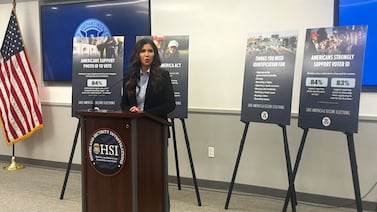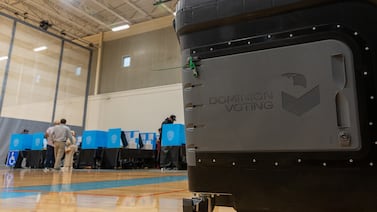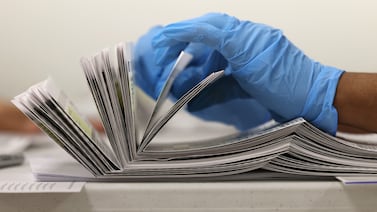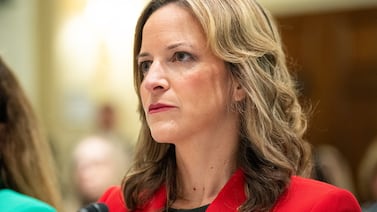2023 is upon us and, per page 10 of the Rulebook for Newsletters, we shall now reflect on 2022. It was a year that concluded on a high note after a peaceful election: Nearly all of the most ardent election conspiracy theorists on the ballot were rejected by voters, and will not take office in the new year. And Congress passed Electoral Count Act reform that would help prevent a future Jan. 6–style attempt at presidential election subversion.
That, in turn, has led to a cluster of cautiously optimistic think pieces wondering whether it may all have just been a passing threat. In fact, one friend at a recent holiday party asked me if I was “worried” about Votebeat’s fundraising prospects, given how emphatically all the people who wanted to undermine elections had lost their races.
At the risk of sounding like a self-serving contrarian, I’m not.
The 2022 midterm dealt a blow to the larger strategy pursued by former President Donald Trump and his followers. It may well have threatened whatever prospects he had to regain his party’s nomination for the presidency. But — as I’ve written and said repeatedly — the threat to local election offices posed by misinformation and entirely fabricated claims of fraudulent activity predated Trump. Those forces remain and have only grown in both their convictions and their financial resources.
In both Maricopa County, Ariz., and Harris County, Texas, solvable but highly visible election administration stumbles have led to extreme local controversy. Bright red counties continue to make strange choices that stand to disenfranchise their own party’s voters, like they did in Cochise County, Ariz. and in Otero County N.M. and are doing now in Lycoming County, Penn..
I said this to the Atlantic last month, when Elaine Godfrey asked me where Votebeat goes from here: “What I’ll be doing over the next two years is looking at these counties that have gone really hard to the right, because there’s no one to push back.”
A recent study by the Voter Study Group found two things: 1) The more rural the voter’s community was, the more likely they were to believe Trump won the 2020 election; 2) The redder their congressional district, the more likely they were to believe Trump won the 2020 election.
Essentially, many voters live in local, ideological echo chambers, where they don’t encounter the powerful facts that would challenge their views.
Votebeat is in a unique position to be able to actually cover that phenomenon and its implications. We didn’t vest all of the authority to cover “Democracy” in a single reporter based in D.C. or New York — we have reporters living and working in the states they cover, talking to local election officials every day and keeping tabs on extremely local policy changes. And because we value local coverage, we’re perfectly positioned to report on the potential interference and threats to elections this year.
Chad Lorenz, our editor in chief, has always said that 2022 was a scrimmage for Votebeat — not the championship. Our reporters covered 2022 with an eye towards the future, because we have known since we opened our (metaphorical) doors that this was a coverage area of durable importance. I think you’ll see our reporters’ depth of local understanding reflected in their 2023 outlooks below. Each is a preview of what they’re watching for and thinking about in their state, some of the big questions they’ll be exploring.
If you think we’ve missed something, or want to be helpful as we do this coverage, I hope you’ll reach out to me (or any of us).
Jen Fifield, Arizona
Arizona’s election system enters 2023 on more solid ground after surviving a year of challenges. But don’t expect tranquility.
Voters rejected Republican candidates for statewide office who made questioning the security and accuracy of our elections a central theme of their campaigns, placing Democrats in the three offices wielding the most power over elections. Governor-elect Katie Hobbs, Secretary of State-elect Adrian Fontes, and Attorney General-elect Kris Mayes (pending recount results) will be sworn in in January.
But the election results were close, and the electorate — along with its representatives — is as divided as ever. Republicans still control the state Legislature and the vast majority of counties, meaning the gulf between state and local leaders has grown.
Hobbs, Fontes, and Mayes will serve as a backstop against any attempts by county officials to disrupt elections and any effort from state lawmakers to dismantle the election system. With far-right Republican lawmakers in powerful positions in the Legislature, expect to see the most extreme proposals from 2022 revived this year, such as getting rid of early voting and eliminating machines used to count votes (especially after Maricopa County’s Election Day printer problems). Hobbs’ veto power is sure to come into play. And Fontes may find himself taking over for Hobbs in responding to challenges from Republican-led counties that tested the waters in 2022.
The question is whether there will be efforts to find a middle ground to introduce common-sense solutions to make elections better. Your guess is as good as ours, but I’ll be reporting on all of it.
Jen’s favorite story she wrote in 2022: Drop box watchers in Arizona connected to national effort from “2000 Mules” creators
Jen’s favorite non-Votebeat story of 2022: The election official who tried to prove “Stop the Steal”
Oralandar Brand-Williams, Michigan
Michigan has been among a handful of swing states whose elections have been under fire by conspiracy theorists. But in November’s election, Michigan residents voted in favor of Proposal 2, a series of measures aimed at adding ballot access guarantees to the state’s constitution.
In 2023, I’ll turn my attention to the ways Prop 2 will usher in changes for Michigan voters. For example, it provides nine days of early in-person voting, allowing voters to insert ballots into tabulators instead of the current option of submitting an absentee ballot at a clerk’s office. Prop 2 also constitutionally solidifies practices that have been around for years, such as being able to cast a ballot without identification.
Prop 2 passed by an overwhelming majority, closing off the possibility of restrictive measures pushed by Republican lawmakers. Now, state legislators and election officials must decide how best to put the changes in place and how to pay for them.
Oralandar’s favorite story she wrote in 2022: After tabulator breaches, here’s how Michigan is trying to ensure security of its voting systems
Oralandar’s favorite non-Votebeat story of 2022: “Prime instigator”: Michigan investigator links Trump-backed GOP AG candidate to voting breach
Carter Walker, Pennsylvania
Now that the midterms are over, I’m wondering what’s next for the movement in Pennsylvania that loudly promoted conspiracy theories about elections. These activists were so vocal throughout the year, but virtually fell off the map once votes were counted and their candidates lost. Their only substantial effort after Election Day, filing requests for recounts in precincts across the state, slowed down certification of the election but otherwise largely failed to achieve its aims.
So where does the movement go from here, if anywhere? I’ll be taking a look at how it all got started, where it is going, and why some extremists are now leaning more heavily into appeals to Christian nationalism — the idea that American identity is inextricably linked to Christianity.
Also, in the new legislative session, I will be watching for any bills that would reshape election laws here, keeping everyone updated on any significant changes ahead of the 2024 presidential election, while also reporting on how municipal and judicial elections are run in 2023.
Carter’s favorite story he wrote in 2022: Rejecting improperly dated ballots disproportionately impacts communities of color in Pennsylvania, data shows
Carter’s favorite non-Votebeat story of 2022: Philly elections officials adopted a last-minute change that will slow down the counting of votes
Natalia Contreras, Texas
This year, I watched election officials in Texas struggle to use limited resources while coping with new legal mandates and increased demands on their labor. It’s already clear 2023 will only bring more of that.
We’re already seeing election-related bills pre-filed ahead of the legislative session. Some of these want more election oversight. One bill prefiled in November would enable candidates, local political party leaders, polling place election workers, and “certain people supporting or opposing ballot measures to trigger investigations, audits, and civil penalties of election officials.” This would require election officials to provide a response to requestors seeking information for an investigation within 20 days. Officials would also have to respond to follow up requests within 10 days. Another pre-filed bill would assign law enforcement officers to investigate election violations and crimes.
But none of these bills yet include more money to help local election departments carry out the new requirements. If the Legislature won’t take steps to help fund elections, will Texas county commissioners —the people who decide how much money the county spends per year — take steps to prioritize funding election departments as much as public safety and first responders?
Election officials are already near their limits, under pressure from two years of questions and allegations from a burgeoning number of election fraud activist groups and some lawmakers who question the security of elections in our state. Local election offices are flooded with public records requests from election skeptics. Some county election departments have had to create new, full-time positions to meet the demand.
SB 1 — a 2021 statute that overhauled voting in Texas by adding new requirements — went into effect this past election year. Among other things, it required counties with more than 100,000 residents to have law enforcement present on election night and to livestream the counting of votes.
Requirements like that cost counties money, and so far, no one is paying the bill. Will it be different in 2023?
Natalia’s favorite story she wrote in 2022: What brought down one Texas county’s entire elections department? It was something in the water.
Natalia’s favorite non-Votebeat story of 2022: Magazona
Carrie Levine, story editor
Since 2020, judge after judge has rejected unfounded election conspiracy theories. Then, in November, it was voters’ turn. Media coverage and watchdogs made it clear democracy was on the ballot, and voters cast most high-profile promoters of baseless accusations to the curb in an election that was thankfully free of violence.
So what am I watching? Where conspiracy theorists’ attempts to manipulate elections goes next, because it almost certainly isn’t over.
Polls show Democrats and independents have more faith in elections after the midterms, but there’s still a significant partisan gap. Candidates who promoted baseless untruths about elections, like gubernatorial candidates Kari Lake in Arizona and Doug Mastriano in Pennsylvania, lost, but millions of people voted for them. And Americans with doubts about the integrity of their elections are still following a carefully crafted playbook, besieging local election officials with requests meant to supercharge research efforts designed to fuel doubts and delays. Where will this movement go between now and the 2024 election? It’s impossible to say for sure, but I’ll be monitoring whether local officials in red counties continue to test the limits of their authority over elections, for one thing.
Chad Lorenz, editor-in-chief, and Lauren Aguirre, engagement editor
As you can see from our staffers’ outlooks, Votebeat’s coverage didn’t end on Election Day. In some ways, that’s when our most important work started.
The most alarming threats to voting may have been averted in 2022, but that doesn’t mean America has resolved its election crisis. The next attacks on elections appear to be more subtle and local — if the last two months of post-election disputes have shown us anything — and will continue to erode trust through baseless criticisms and misinformation. We’ll be monitoring the power and sustainability of those attacks between now and Nov. 5, 2024 (and probably beyond).
We also know the year between federal elections is an important transitional phase for policy. It’s a quiet time for elections only if you think elections just spontaneously happen every other November. All across the country, this year’s debates and decisions about election laws and funding will affect voters and administrators next year. Votebeat will keep pursuing our mission of producing journalism that strengthens elections by identifying problems and driving the conversations toward solutions. Even in an America where elections are not under partisan and extremist attacks, there’s a need for constant reporting about making voting fairer and more accessible.
That work involves you, too. We want to know: What election journalism is most valuable to you now? What questions do you have about voting and election administration? What else would you like Votebeat to cover or focus on this year?
Please reply to this email with your thoughts and feedback — whether you think there’s something else we should pay attention to or you’re very excited about one topic in particular.
Jessica Huseman is Votebeat’s editorial director and is based in Dallas. Contact Jessia at jhuseman@votebeat.org.





